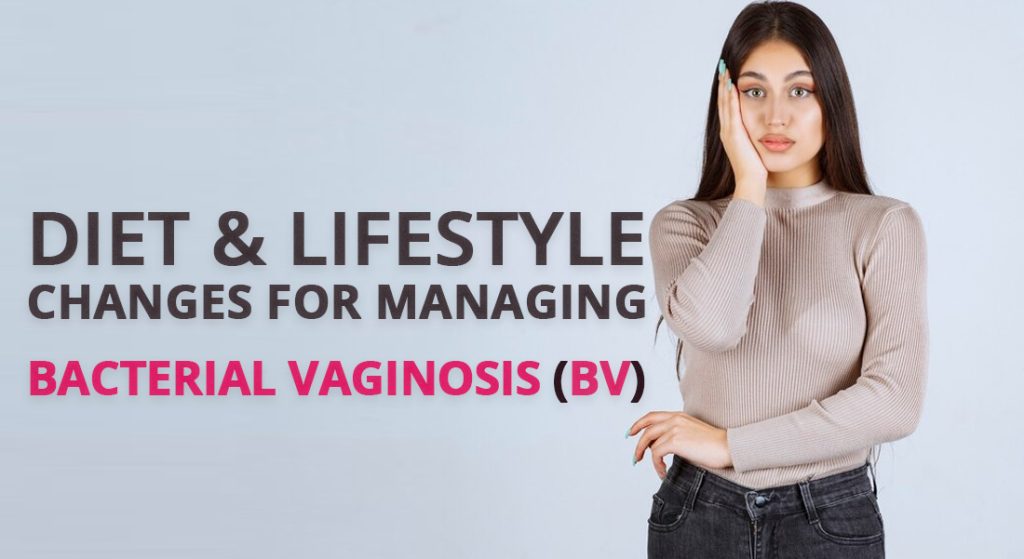Battling Bacterial Vaginosis: A Holistic Guide to Wellness and Online Consultations
Bacterial Vaginosis, often called BV, is a common vaginal infection that can affect women of all ages. While medical treatments and Vaginitis consultations online are available, many individuals seek natural ways to manage and prevent recurrences.
This is where diet and lifestyle changes come into play. In this extensive article, we’ll explore how the choices you make in your everyday life, particularly regarding diet and lifestyle, can have a significant impact on your Bacterial Vaginosis (BV) management.
What is Bacterial Vaginosis?

Diet and Nutrition for BV Management
Managing BV effectively involves a holistic approach, which requires changes in lifestyle, along with regular treatment. You can leverage vaginitis online consultation services to find the best approach for treatment.
Foods to Include
- Probiotic-Rich Foods: Incorporate yogurt, kefir, kimchi, and other fermented foods into your diet. These are rich in beneficial bacteria that can help restore the balance of vaginal flora. Probiotics have been widely studied for their potential in preventing and managing BV. The live cultures in these foods can help maintain a healthy vaginal environment.
- Fiber-Rich Foods: A high-fiber diet can support overall health and may indirectly help in preventing BV. Fiber aids in maintaining regular bowel movements, which can help reduce the risk of BV. You can include whole grains, vegetables, and fruits in your daily meals.
- Foods with Essential Nutrients: Ensure you’re getting the right vitamins and minerals from your diet, including vitamin D and zinc, which can bolster your immune system. This, in turn, can prevent and fight off the different types of infections, including BV.
Foods to Avoid or Limit
- Sugar and Processed Foods: A diet high in sugar and/or processed foods can lead to an imbalance in your body’s microbiome, potentially worsening BV. High sugar consumption has been linked with an increased risk of BV. It’s essential to limit your intake of sugary snacks, sweetened beverages, and processed foods.
- Excessive Alcohol and Caffeine: Limit your alcohol and caffeine intake, as these can disrupt your body’s natural balance. Alcohol and caffeine can affect your hormonal balance and weaken your immune system, making you more susceptible to BV.
Hydration and BV
Drinking enough water is crucial for maintaining good vaginal health. Staying adequately hydrated helps to flush toxins from your body and maintain the right balance of fluids. It also ensures that your body can effectively remove waste and harmful substances.
Lifestyle Changes
Making changes in your lifestyle is essential in managing BV. Here are a few things you can do:
Hygiene Practices
Good hygiene practices are essential in preventing BV. Here are some tips to consider:
- Appropriate Cleansing Methods: When it comes to personal hygiene, it’s crucial to use gentle and fragrance-free products. Avoid using douches or strong soaps, as they can disrupt the natural pH and balance of the vagina. Opt for mild, pH-balanced cleansers.
- Avoiding Douching: Douching is a common practice that requires rinsing the vagina with water or other fluids. However, it’s not recommended, as it can wash away the healthy bacteria that help maintain the vaginal balance. Instead, let the vagina self-clean with its natural processes.
Stress and BV
Chronic stress can deeply weaken the immune system and make the body more susceptible to infections, including BV. Managing stress is essential for health and can indirectly help with BV prevention. Consider integrating stress-reduction techniques into your daily routine:
- Yoga: Yoga is known for its stress-relieving and relaxation benefits. Regular practice can help reduce stress and promote a sense of well-being.
- Meditation: Meditation can help you manage stress. It involves focusing your mind on the present moment and can be done anywhere and at any time.
- Deep Breathing: Simple deep breathing exercises can be effective in reducing stress. Taking slow, deep breaths can calm your nervous system and help you feel more relaxed.
Regular Exercise
Regular physical activity helps improve circulation and overall health. It can also indirectly support your immune system and reduce the risk of BV. Physical activity has numerous benefits for your health, including:
- Immune System Support: Regular physical activity can strengthen your immune system, making it more efficient at fighting off infections.
- Stress Reduction: Physical activity is a natural stress reliever. It releases endorphins, which are known as “feel-good” hormones. These endorphins can help reduce stress and improve your mood.
- Weight Management: Maintaining a healthy weight through exercise can decrease the risk of several health conditions, including BV. Excess weight can contribute to imbalances in the body, making it more susceptible to infections.
Quality Sleep
Adequate, restorative sleep is crucial for overall health. Sleep helps your body recover and rejuvenate, which is essential for a robust immune system. Poor sleep patterns can weaken your immune response and increase the likelihood of infections.
Here are some tips:
Create a Sleep Routine: Establish a uniform sleep schedule by sleeping and rising at the same times every day. This helps regulate your body’s internal clock.
Create a Comfortable Sleep Environment: Ensure your sleeping environment is conducive to rest. This includes a comfortable mattress and pillows, as well as a dark, quiet room.
Limit Screen Time Before Bed: Your cellphone emits a blue light, which can severely disrupt your sleep patterns. Be sure to stop using your electronic devices at least an hour before sleeping.
Probiotics and Supplements
Incorporate probiotics into your daily routine. Probiotics in supplement form or through food can help maintain a balanced microbiome. Additionally, some supplements may be helpful in BV management but take vaginitis consultation online before starting any new supplements.
Wrapping Up
Managing Bacterial Vaginosis effectively involves a combination of approaches. If you improve your diet and lifestyle, you can create an environment in your body that supports the natural balance of vaginal flora. These changes, alongside medical treatments if necessary, can significantly reduce the risk of BV recurrence.
However, each individual’s body is unique, and what works for one person may not work for another. If you’re struggling with BV, it’s essential to consult an online healthcare professional for personalized advice on the best treatment plan for your specific situation.
Start making these diet and lifestyle changes today to support your journey towards better vaginal health. Incorporating these diet and lifestyle changes can help you manage and prevent Bacterial Vaginosis more effectively. Remember that consistency is key, and it may take time to see noticeable improvements. Be patient with your body as it adapts to these changes, and consult a healthcare professional for guidance along the way.
Are you seeking expert advice on Bacterial Vaginosis? GetCareMD offers online consultations for BV treatment. Consult with our healthcare professionals and take the first step toward better health.
Final Conclusion: Empower your journey to better vaginal health with a holistic approach to Bacterial Vaginosis. Combine lifestyle changes, expert advice through online consultations, and consistent efforts for a balanced and thriving well-being.
CTA: Ready to reclaim your vaginal health? Schedule your online consultation with GetCareMD—your partner in holistic well-being! Online Consultation For Bacterial Vaginosis.


